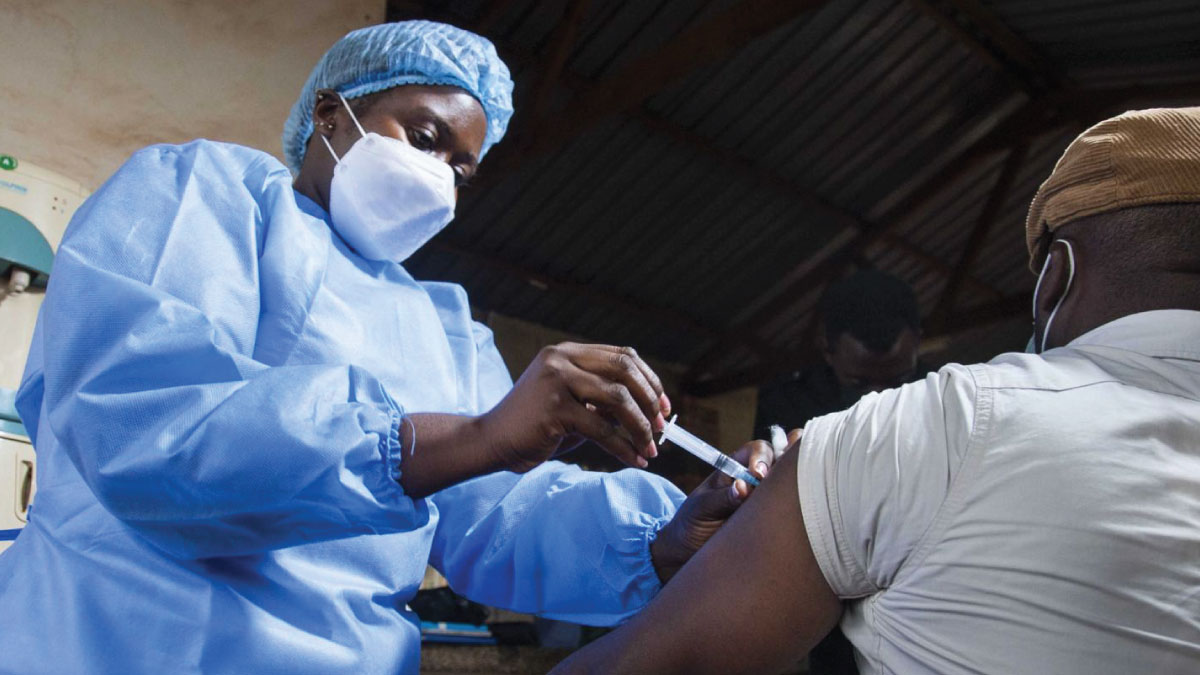Secretary-General Rebeca Grynspan said that although the Global South has risen as an economic power, it remains behind in metrics that matter the most.

© UNICEF Uganda/2021/Kabuye | A health-care worker in Uganda administers a COVID-19 vaccine.
UNCTAD Secretary-General Rebeca Grynspan underscored on 21 January at the Group of 77 and China’s Third South Summit the systemic inequalities that hinder developing countries’ efforts to achieve sustainable development.
In her statement to the summit in Kampala, Uganda, Ms. Grynspan highlighted that despite now accounting for 86% of the world population, about 58% of global economic output, in terms of purchasing power parity, and almost half of world merchandise exports, these nations remain underrepresented in key international institutions.
For example, the boards of the International Monetary Fund (IMF) and the World Bank had 12 seats representing 44 countries. Today, each board has 25 seats representing 190 countries. Ms. Grynspan highlighted that to preserve the original proportion of representation, the boards of these institutions would need to double in size.
Similarly, while developing countries contribute 58% of global GDP and comprise 86.4% of the world population, they hold only 41% of the votes at the IMF.
Left behind on ‘metrics that matter most’
The UNCTAD chief said systemic inequalities materialized in the uneven distribution of resources like vaccines and finance during the COVID-19 pandemic, which hindered developing countries’ responses to the crisis. Similarly, these nations are least responsible for climate change yet bear the heaviest costs.
Systemic inequalities, she said, are thwarting progress towards the Sustainable Development Goals, with only 15% currently on track. They have also led to a situation where 3.3 billion people – almost half of humanity – live in countries that spend more money paying interest on their debts than on education or health.
“In the metrics that matter most, the Global South is being left behind,” she said.
Sluggish growth hits developing countries
At the summit, UNCTAD co-hosted a high-level event with China and Uganda on enhancing economic resilience through broader South-South cooperation.
Speakers, including Ugandan President Yoweri Museveni and Ms. Grynspan, highlighted the asymmetries of the global trading system and the need for affordable long-term financing.
They raised concerns about sluggish growth in trade and investment, which is particularly affecting developing economies.
Recent UNCTAD analysis revealed that in 2023 global trade fell by 5%, with a more pronounced downturn in developing countries, where imports and exports declined by 6% and 7%, respectively.
Furthermore, while foreign direct investment grew globally last year, it fell by 9% in developing countries, which already faced a widening trillion dollar investment deficit to achieve the Sustainable Development Goals by 2030.
Redefine metrics for development and well-being
In her statement, Ms. Grynspan highlighted the need to redefine development and well-being beyond GDP.
“These discussions are not just theoretical or abstract,” Ms. Grynspan said. “They are about the lives of billions of people, the overwhelming majority of which live in our countries.”
She said the Third South Summit was a pivotal moment to build a stronger partnership between UNCTAD and the Group of 77 and China, urging those in attendance “to carry forward a sense of hope and a call to action”.
“We have the knowledge, the resources and the collective will to create a better world and reinvigorate the multilateral system. Whatever the contradictions, we are in a much better place to make a difference today than 60 years ago. But time is running out.”



